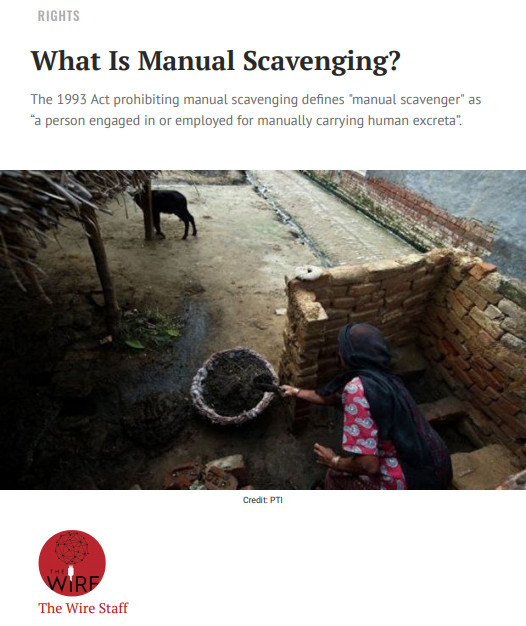What Is Manual Scavenging?
 |
press article Jul 2016 ; 1 pages
Ed. The Wire -
Downloadable format: PdF
Downloadable from the publisher
Abstract:
The Employment of Manual Scavengers and Construction of Dry Latrines (Prohibition) Act, 1993 defines ‘manual scavenger’ as “a person engaged in or employed for manually carrying human excreta”. The employment of manual scavengers is prohibited as a criminal offence.
The recently enacted Prohibition of Employment as Manual Scavengers and their Rehabilitation Act, 2013 gives a detailed definition of ‘manual scavenger’ as:
“a person engaged or employed, at the commencement of this Act or at any time thereafter, by an individual or local authority or an agency or a contractor, for manually cleaning, carrying, disposing of, or otherwise handling in any manner, human excreta in an insanitary latrine or in an open drain or pit into which the human excreta from the insanitary latrines is disposed of, or on a railway track or in such other spaces or premises, as the Central Government of a State Government may notify, before the excreta fully decomposes in such manner as may be prescribed…”
In practice, these definitions are incomplete. It is important, therefore, to turn to other social and historical materials to understand what manual scavenging really means. The Asian Human Rights Commission, for instance, describes manual scavenging in the following terms:
“Manual scavenging in India is officially defined as ‘lifting and removal of human excreta manually’, at private homes and toilets maintained by municipal authorities. The practice consists of gathering human excreta from individual or community dry latrines with bare hands, brooms or metal scrapers into woven baskets or buckets. This the scavengers then carry on their heads, shoulders or against their hips, (and in wheelbarrows if they can afford it) into dumping sites or water bodies. Apart from this, many scavengers are similarly employed to collect, carry and dispose excreta from sewers, septic tanks, drains and railway tracks.”
Keywords: |
occupation - profession (CI) (DT) (ET) , sludge (CI) (DT) (ET) |
Country: |
Publisher/Broadcaster: |
|
The Wire - - India |
If there is a broken link, we will be pleased to receive a message: communication@pseau.org